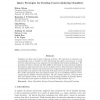Free Online Productivity Tools
i2Speak
i2Symbol
i2OCR
iTex2Img
iWeb2Print
iWeb2Shot
i2Type
iPdf2Split
iPdf2Merge
i2Bopomofo
i2Arabic
i2Style
i2Image
i2PDF
iLatex2Rtf
Sci2ools
CORR
2010
Springer
2010
Springer
Query Strategies for Evading Convex-Inducing Classifiers
Classifiers are often used to detect miscreant activities. We study how an adversary can systematically query a classifier to elicit information that allows the adversary to evade detection while incurring a near-minimal cost of modifying their intended malfeasance. We generalize the theory of Lowd and Meek (2005) to the family of convex-inducing classifiers that partition input space into two sets one of which is convex. We present query algorithms for this family that construct undetected instances of approximately minimal cost using only polynomially-many queries in the dimension of the space and in the level of approximation. Our results demonstrate that near-optimal evasion can be accomplished without reverseengineering the classifier's decision boundary. We also consider general p costs and show that near-optimal evasion on the family of convex-inducing classifiers is generally efficient
| Added | 09 Dec 2010 |
| Updated | 09 Dec 2010 |
| Type | Journal |
| Year | 2010 |
| Where | CORR |
| Authors | Blaine Nelson, Benjamin I. P. Rubinstein, Ling Huang, Anthony D. Joseph, Steven J. Lee, Satish Rao, J. D. Tygar |
Comments (0)

